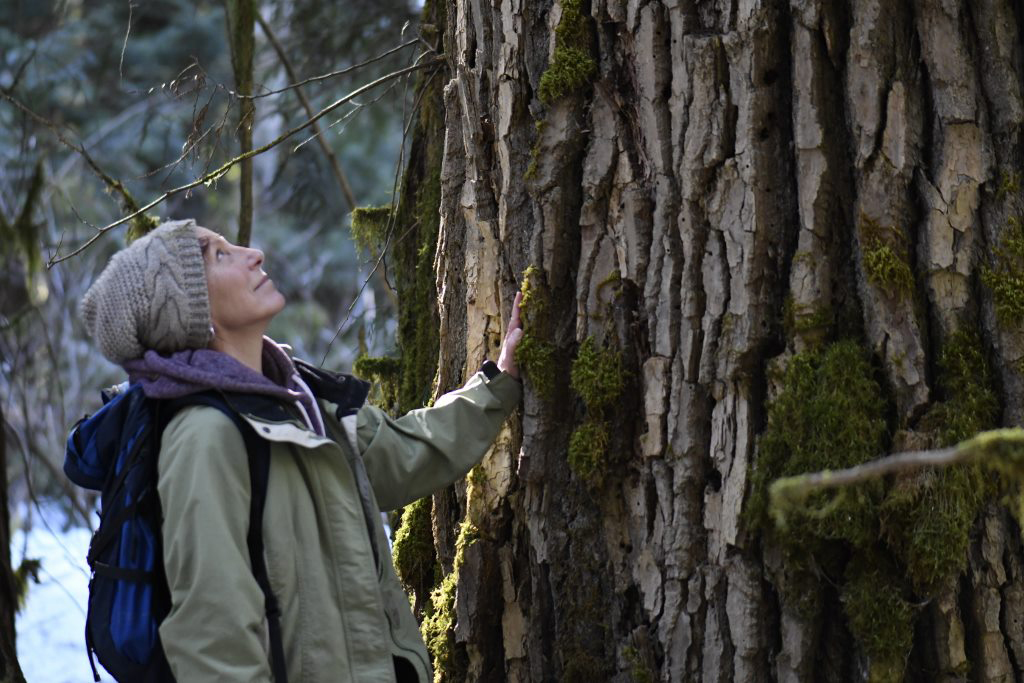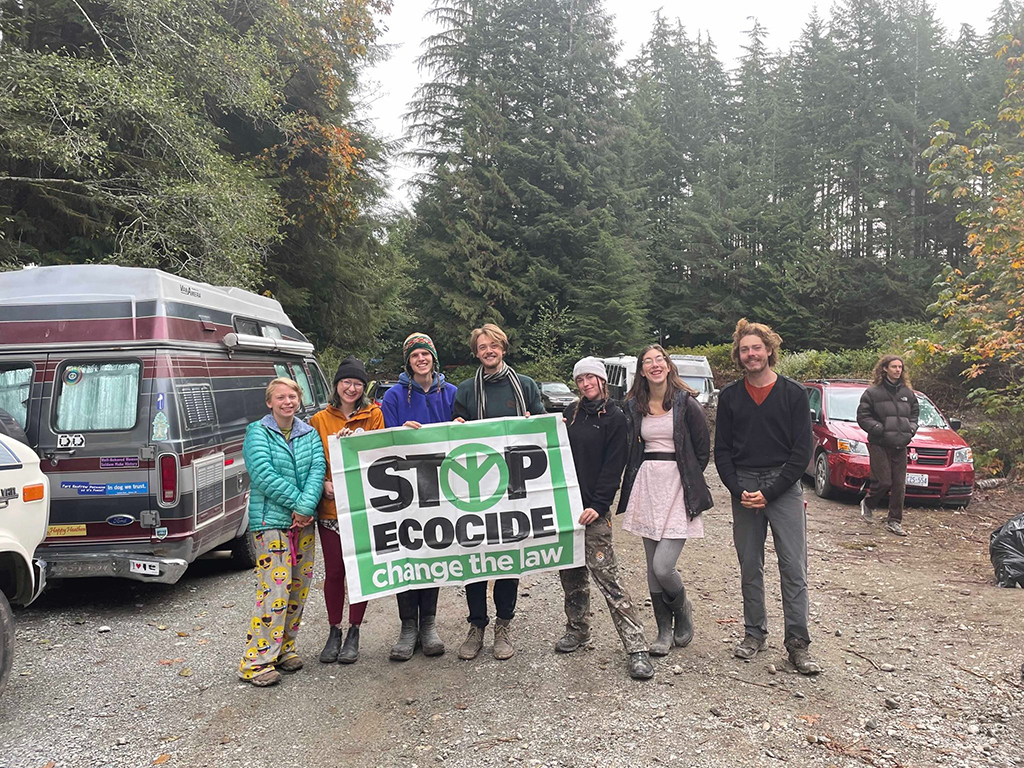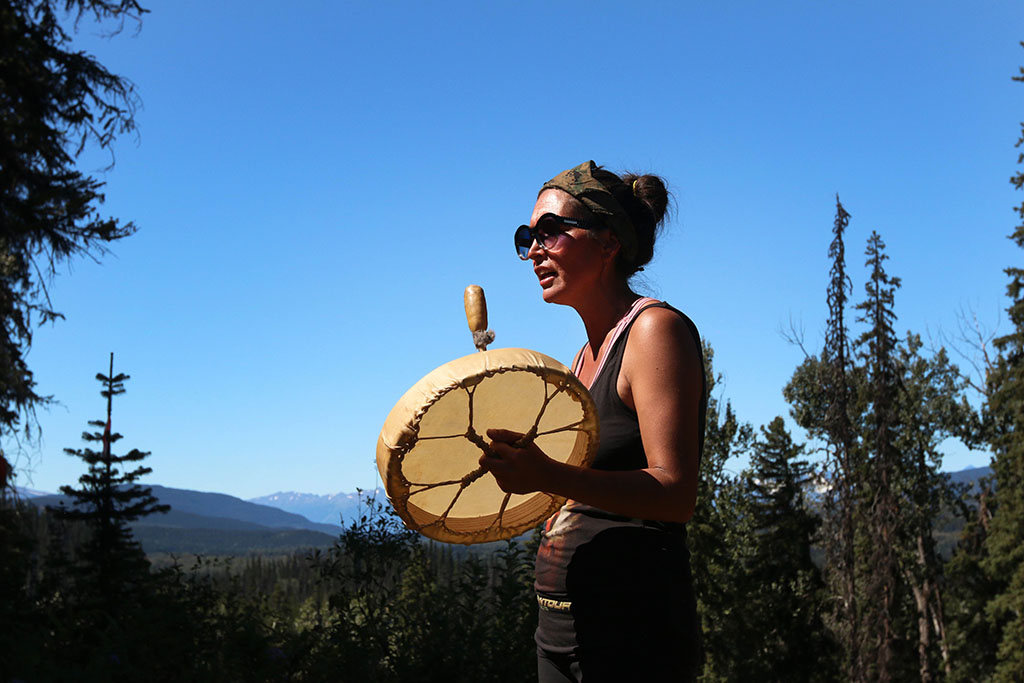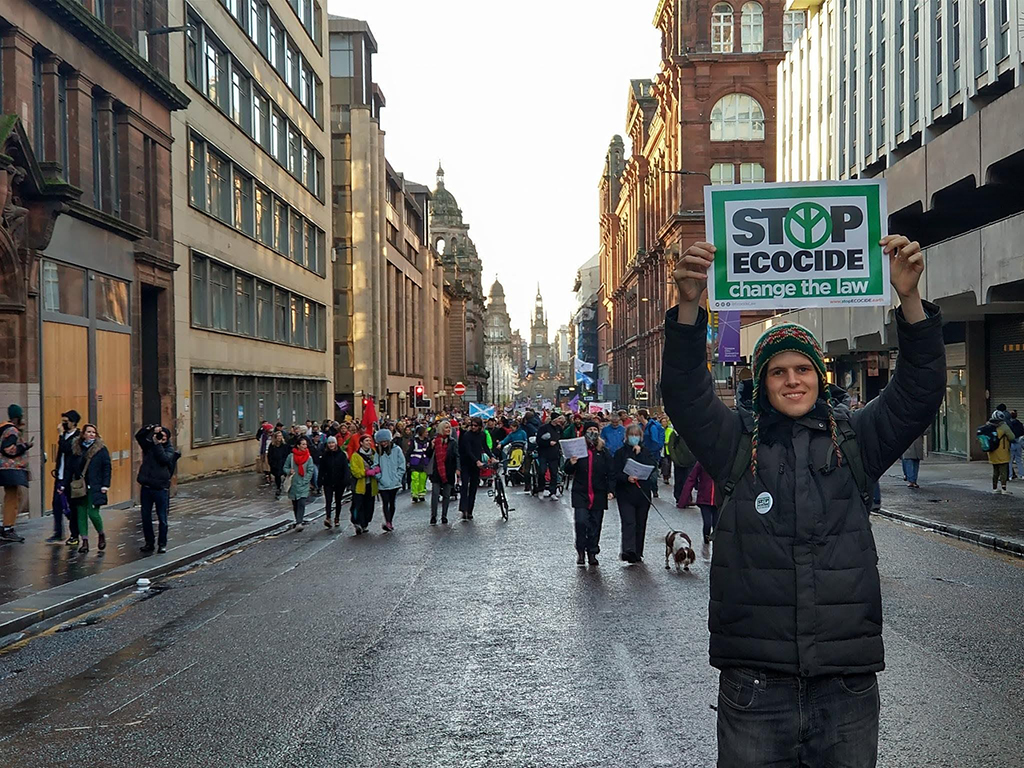At just 22, Nelson resident Jamie Hunter has been at the forefront of several climate justice actions, some of which he helped initiate. He defied a court injunction at Fairy Creek to protect the old-growth forest and organized one of the biggest climate strikes in downtown Nelson. The young environmental activist’s work for climate justice earned him a spot in the Starfish Canada’s Top 25 Environmentalists Under 25 list back in 2020.
He decided to make environmentalism his life’s calling when he turned 18 and learned about fracking, a drilling technique used to extract natural gas and oil.
“Realizing how the chemicals used in the process can be so damaging to nature prompted me to get out onto the streets and do something for the environment,” he says. “The decision ultimately changed my life and a lot has happened since then.”
Hunter says that he owes a great deal of his work so far as a climate activist to his hometown of Nelson in B.C.’s West Kootenay region.
“This place [West Kootenay] has always encouraged environmental campaigns. So it's much easier to get involved in something like this when your community is so supportive,” explains Hunter.
A small town nestled in the Selkirk Mountains along the West Arm of Kootenay Lake, Nelson has been known to punch above its weight when it comes to advocating for climate solutions. The West Kootenay region is considered an incubator for innovative ideas and environmental campaigns. Canada’s first Youth Climate Corps started in the Kootenays, and so did the Climate Caucus, a group of over 400 elected municipal officials from across the country pushing for climate action at higher levels of government.
More recently, another West Kootenay campaign has been gaining traction. Known as Stop Ecocide Canada, the campaign aims to criminalize the large-scale damage and destruction of ecosystems.
Hunter started the campaign sometime in April 2020 along with co-founder Dona-Grace Campbell, a long-time climate justice activist from Kaslo, a village in the West Kootenay region. Stop Ecocide Canada is a key part of a larger international effort that aims to make damages inflicted upon nature legally and morally unacceptable.


A new legal definition
Launched in 2017, Stop Ecocide International works with an exclusive focus: to criminalize the destruction of ecosystems under the jurisdiction of the Rome Statute of the International Criminal Court alongside genocide, crimes against humanity, war crimes and crimes of aggression.
Ecocide literally means “killing the environment.” But what does the term really encapsulate?
To answer this question, a 12-member team of international lawyers unveiled a new legal definition of “ecocide” on June 22, 2021. The legal definition outlines ecocide as “unlawful or wanton acts committed with knowledge that there is a substantial likelihood of severe and either widespread or long-term damage to the environment being caused by those acts.”
Under this definition, Stop Ecocide International lists several activities that can lead to environmental destruction, such as industrial fishing, oil spills, plastic pollution, deep sea mining, industrial livestock farming and fracking.
As the movement for criminalizing ecocide has gained momentum globally, leaders of nations in the southern hemisphere hard hit by climate change are at the forefront. However Iceland, Luxembourg, the United Kingdom, Finland and Spain have expressed varying levels of support for the idea and, by a large majority, the Belgian parliament voted to recognize the crime of ecocide at both the national and international level. Pope Francis is among those calling for such a law.
But not all environmental advocates are on board. Some critics of the idea note there are already laws on the books against pollution but legal cases take a long time and even when corporations are punished, their industries continue to damage the planet. “Despite its intentions, criminalizing ecocide fails to tackle the root causes of ecological harm,” argues a 2021 Euronews article.
Another analysis by the International Peace Institute is more supportive but cautions that “environmental harms can be slow to materialize, and ecocide is likely to throw up a range of challenges surrounding proving causality and responsibility, gathering evidence and finding relevant experts.”
In December, Stop Ecocide took centre stage during the 20th annual meeting of the ICC where Bangladesh, Samoa and Vanuatu advocated for criminalizing environmental destruction. This was a significant moment for the international campaign, says Canadian human rights lawyer Lisa Oldring.
According to Oldring, the legal process to include ecocide as an international crime can only begin when a head of state from a member nation of the ICC proposes an ecocide amendment to the Rome Statute. Once it achieves a simple majority from member states, the amendment can enter into consideration, explains Oldring.
“It’s promising to see support pouring in from many nations,” she says.
“If the proposed amendment of criminalizing ecocide gets 82 out of the 123 member countries’ votes in its favour, it can be adopted into the statute. And ratification and enforcement can proceed,” she says.
The Rome Statute also requires that if a member country agrees to vote in favour of the amendment, it must then criminalize ecocide in the domestic legislation as well.
This is what the Canadian chapter of Stop Ecocide aims to achieve — get the federal government to declare its support for an amendment to the Rome Statute and advocate its adoption both nationally and internationally.
‘We have expanded across the country’
Over the last couple of years, Hunter and Campbell have been hard at work to spread the word and garner support from all over Canada.
“In just a short while, we have expanded to provinces across the country from B.C. to Nova Scotia,” said Campbell.
The duo has also been meeting with offices of justice, global affairs and diplomats to the ICC and the members of Parliament from across the political spectrum.
“So far the people have been receptive to the idea of ecocide law,” says Hunter.
In November 2020, the Green Party of Canada endorsed the ecocide movement, submitting a petition urging the House of Commons to push for criminalizing ecocide.
The Canadian government has promised to “follow the discussions on ecocide at the international level.” Critics want a firmer stance.
“Canada played a pivotal role in establishing the ICC. It contributed to the development of its founding treaty, the Rome Statute and became among the first countries to ratify the statute in 2000,” says Campbell. “It’s within the Canadian psyche to support this movement and act on its commitment to be a world leader for climate.”
But Canada’s economy is still strongly tied to mining and fossil fuels, notes Hunter: “The reason we’re facing an ecological emergency today is because of decades of unchecked, widespread and systematic harm to nature caused by detrimental industrial activities like fracking.”
Despite Canada’s ambitious goal to reduce greenhouse gas emissions, the government is actively building new oil and gas pipelines while banks continue financing fossil fuel companies.
According to the 2022 Banking on Climate Chaos report, Canada’s top five banks increased their fossil fuel financing by $61 billion last year while in the last six years, Canadian banks have funnelled $911 billion into coal, gas and oil.
As of now, the only penalties for corporations involved in destructive environmental practices are lawsuits and fines for breaking regulations, which Hunter argues can simply be written into the budget.
It’s not clear how an ecocide law at the national or international level, or both, would apply to, for example, the Coastal GasLink pipeline — a multibillion dollar project that will carry natural gas from near Dawson Creek in northeast B.C. through unceded Wet’suwet’en territory to the LNG Canada processing plant on the coast in Kitimat. The continuation of the project, which is partly bankrolled by the Royal Bank of Canada and backed by the B.C. and federal government, so far has been affirmed by the courts.
Campaigners and celebrities have urged RBC to defund the project given its impact to the environment and opposition within the Wet’suwet’en Nation. Wet’suwet’en Hereditary Chiefs, who claim jurisdiction over the nation’s entire traditional territory, want the project halted, while five elected Wet’suwet’en Band Council Chiefs, who have jurisdiction over reserve lands under the Indian Act, have signed deals to let it go ahead.
Environmental critics say the project contradicts both Canada’s international climate commitments and B.C. legislation intended to stem the climate crisis, which promises “net zero” emissions by 2050. According to the B.C. Environmental Assessment Office, the pipeline if operated at full capacity will release about 3.52 megatonnes of carbon emissions per year in its initial phase alone, which would be a six per cent increase to provincial emissions.
TC Energy, the company that owns Coastal Gaslink, maintains that the natural gas extracted by fracking will displace coal for power generation and significantly reduce annual global carbon emissions.
Critics point to research finding fracked gas — from drilling to burning as fuel — generates emissions similar to coal. The process also uses large amounts of water, which can become contaminated and affect local groundwater.
‘We are seeing ecocide happen firsthand’
The Coastal GasLink pipeline worksite on Gidimt’en Clan territory in northwest B.C. wants to drill under the Wedzin Kwa, or Morice River, a source of sustenance and tradition for the Wet’suwet’en Nation. To protect the river, the Indigenous land defenders at Wet’suwet’en set roadblocks to the pipeline drilling site on Sept. 24.
In response, the RCMP arrested dozens of protesters last September to November while enforcing a Coastal GasLink injunction, and among them 19 have since been charged with criminal contempt of court including Molly Wickham, a member and spokesperson of the Gidimt’en Clan of the Wet’suwet’en Nation.

Wickham, during a webinar hosted by Stop Ecocide Canada back in February last year, referred to Coastal Gaslink’s activities in Wet’suwet’en territory as ecocide.
“We are seeing ecocide happen firsthand. The pipeline hasn’t been built yet and already it has affected our lives. Once it gets built, it will destroy our sacred river, which is a spawning ground for salmon,” she said.
Last week, on July 7, crown prosecutors charged Wickham and three other land defenders for breach of an injunction granted to Coastal GasLink.
Wickham issued a statement on social media platforms following the court’s decision: “State and industry are using these courts and colonial laws as tools of genocide to diminish our rights. Canada has a long dark history of targeting Indigenous land defenders through the courts and for a provincial government that claims to support reconciliation, today’s decision smacks of hypocrisy.”
Activists are calling this criminalization of pipeline opponents a corporate hijacking of the judicial system.
“It is sad to see people defending their environment being framed as criminals,” said Campbell.
In an article published on July 1 about policing Indigenous land defense and climate activism, author and activist-researcher Jen Gobby talks about how policing and the judicial system serves to actively protect the interest of big corporations.
“Courtrooms are routinely places of asserting settler-colonial power over Indigenous laws and values, denying Indigenous rights. Institutional power is exerted through the courts that render judgments and sentencing, and then it is exerted through the prison system where land defenders serve sentences,” she writes.
According to Gobby, corporations and the judicial system often exert their power in the form of injunction to protect their interests against Indigenous land defenders and others resisting pipelines in Canada.
A similar perspective is contained in a 2019 report from Yellowhead Institute, an Indigenous-led think tank, which after reviewing nearly 100 injunction cases, found that corporations succeeded in 76 per cent of injunctions filed against First Nations, while First Nations were denied in 81 per cent of injunctions against corporations.
Making ecocide a crime would flatten this legal disparity, providing protection to the environment and those who protect it, claims Hunter.
“The odds are stacked up against the people who defend the environment. But if you move ecocide into the criminal law arena, you're actually changing that equation a bit, because you're providing personal criminal responsibility,” says Hunter.
“So there’s a way in which ecocide as a serious crime actually has a really potentially powerful deterrent effect that will deter big corporations from taking potentially devastating environmental risks.” ![]()
Read more: Indigenous, Rights + Justice, Environment

















Tyee Commenting Guidelines
Comments that violate guidelines risk being deleted, and violations may result in a temporary or permanent user ban. Maintain the spirit of good conversation to stay in the discussion.
*Please note The Tyee is not a forum for spreading misinformation about COVID-19, denying its existence or minimizing its risk to public health.
Do:
Do not: